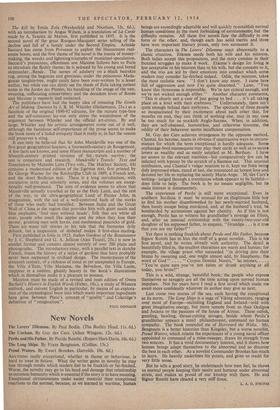New Novels
beings are exceedingly adaptable and will quickly re-establish normal human conditions in the most forbidding of environments; but the difficulty remains. All these five novels face the difficulty in one form or the other, and, though each has solid merits and three have won important literary prizes, only two surmount it.
The characters in The Lovers' Dilemma react abnormally to a classic situation. Etienne needs both his wife and his mistress. Both ladies accept this proposition, and the story consists in their frenzied struggles to make it work. Etienne's design for living is less acceptable to his mistress than to his wife, but she consents to it, and the trio are led by their emotions into conduct which some readers may consider far-fetched indeed. Odile, the mistress, takes the most realistic view. "I don't know any more. I came here full of aggression and now I'm quite disarmed." Later, "You know this threesome is impossible. We're not cynical enough, and we're not wicked enough either." Another character comments, "This is clearly not a case of just going to bed . . . it's all taking place on a level with their eyebrows." Unfortunately, there isn't quite enough behind their eyebrows. The spectacle of three people so incapacitated by their excitement about each other that, for months on end, they can think of nothing else, may in any case be too much for us stockish Anglo-Saxons. When, in addition, they are self-obsessed, humourless, and otherwise tiresome, the oddity of their behaviour seems insufficient compensation.
M. Guy des Cars achieves strangeness by the opposite method. Chantal, his heroine, reacts in obvious if unattractive ways to circum- stances for which the term exceptional is hardly adequate. Some orphanage-bred mannequins may play their cards so well as to secure lovers as wealthy and as easily sautsfied as M. Berthon. I have no access to the relevant statistics—but comparatively few can be infected with leprosy by the scratch of a Siamese cat. This unusual retribution, and Chantal's vulgar reaction to it, kept me from being duly impressed when, cured at last, she renounced an honest love and devoted her life to replacing the saintly Marie-Ange. M. des Cars's writing—judged through a translation which appears to tie faithful— does little to help. The book is by no means negligible, but its main interest is documentary.
The experience of Perdu is still more exceptional. Even in southern Sardinia it must be unusual for an illegitimate little boy to find his mother disembowelled by her newly-married husband, then barely escape being murdered, and, at the husband's trial, be bombarded by accusations against her chastity. As if this is not enough, Perdu has to witness his grandfather's revenge on Efisio, and, after an unusual relationship with the twenty-two-year-old daughter of his supposed father, to enquire, "Grandpa .. . is it true that you are my father?"
Yet there is nothing freakish about Perdu and His Father, because Signor Rombi has in him the stuff of a great novelist. This is his first novel, and he writes already with authority. The detail is beautifully filled in, the smallest characters are warm and human; for example, the village priest who succeeded "in driving into their brains by swearing and, one might almost add, by blasphemy, the word of God" . . . . "Corpus Domini Nostri," he intones, . . "You're quite sure you've not eaten or drunk anything at all today, you brute?"
This is a wild, strange, beautiful book; the people who express themselves so savagely are all the time acting upon normal human impulses. Not for years have I read a first novel which made me await more confidently whatever its author may give us next.
Last come two stories of the sea, each having the exceptional as its norm. The Long Ships is a saga of Viking adventure, ranging over most pf Europe—including England and Ireland—told with great imaginative energy, but more remote from us than Oedipus and Jocasta or the passions of the house of Atreus. These oafish, guzzling, bawling, throat-cutting savages, beside whom Perdu's grandfather appears a timid philanthropist, command no human sympathy. The book reminded me of Hereward the Wake. Mr. Bengtsson is a better historian than Kingsley, but a worse novelist. Proud Waters, which relates the experiences of a young naval officer appointed to command of a mine-sweeper, draws its strength from two sources. It has a vivid documentary interest, and it shows how human beings adapt themselves to the abnormal and so discover the best in each other. As a novelist Commander Brookes has much to learn. He heavily underlines his points, and gives us credit for very little sense.
But he tells a good story, he understands how men feel, he shows us normal people keeping their sanity and humour under abnormal stress, and makes us proud of our kinship With them. He and Signor Rombi have cleared a very stiff fence.
L. A. G. STRONG


































 Previous page
Previous page